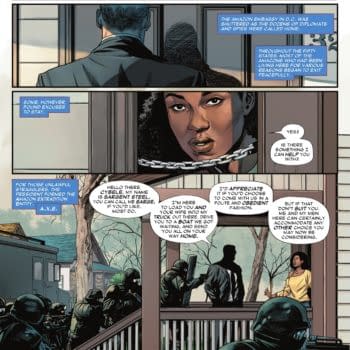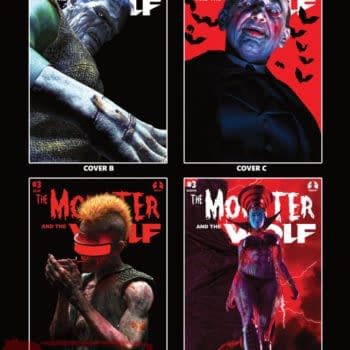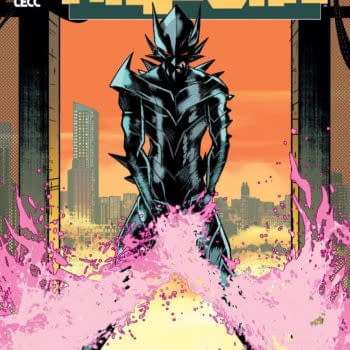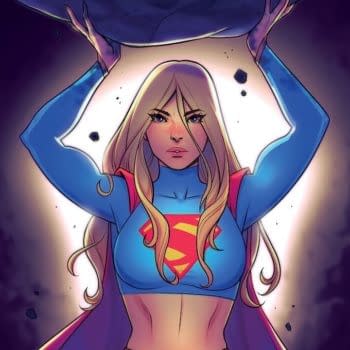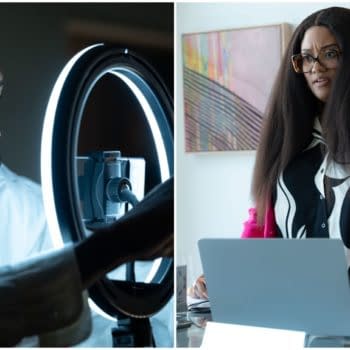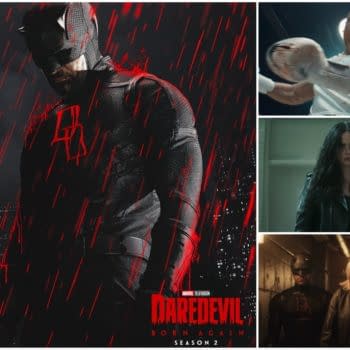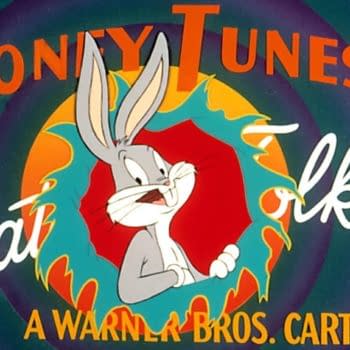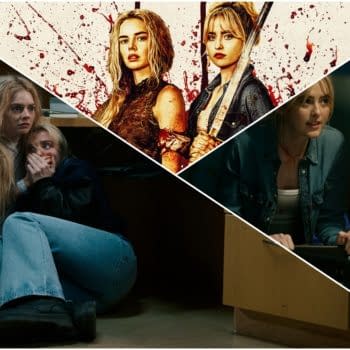Posted in: Disney, Marvel Studios, Movies | Tagged: china, chris fenton, dmg, iron man 3, looper, marvel
How Chris Fenton Tried to Save The World With Iron Man 3 and Looper
Chris Fenton
Over the last couple of months, Bleeding Cool has covered a lot of stories featured in Chris Fenton's book Feeding The Dragon. Fenton was president of the China-based DMG Entertainment Motion Picture Group, General Manager of DMG North America (owners of Valiant Comics), and Senior Advisor to IDW Media Holdings. I recently read it, and it made for quite the page-turner, and there are so many nuggets to share. You can follow along with a few I wrote with this tag looking at his adventures in high-international movie-making between the USA and China, including Looper and Iron Man 3 – as well as The World's Strongest Man, Hanson, and more – and turning Chinese peasant farmers into security men for one day, catching Robert Downey Jr fans falling out of trees on the red carpet at The Forbidden City. And while much of Fenton's motivation is making money, as well as explaining what's really in it for China, he also talked about his own motivations. World peace.
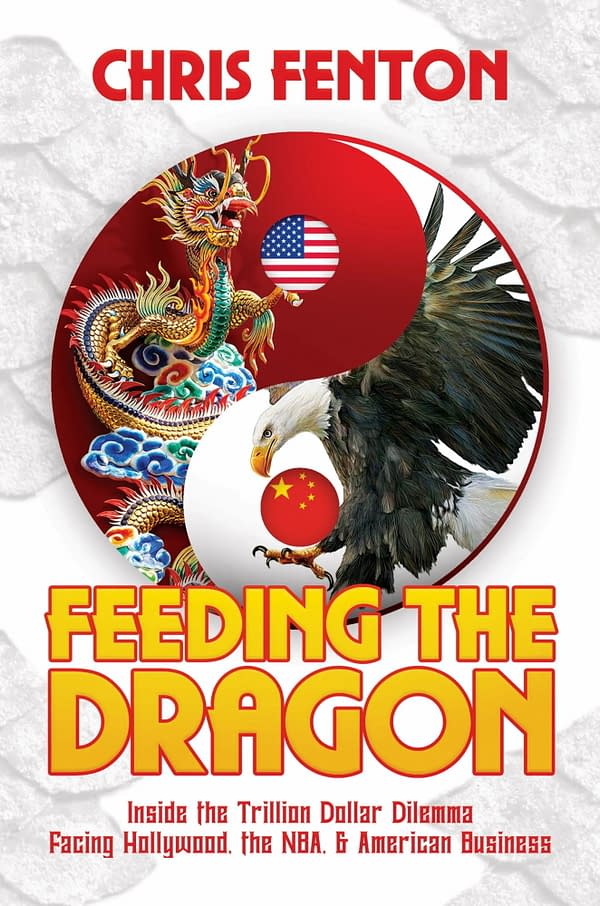
Early in the book, which begins with Robert Downey Jr's Beijing red carpet, he writes;
Like most ambassadors, I had developed a love and loyalty to my adoptive country. I felt a sense of mission that went far beyond box-office numbers. US-China relations were on the line. We all knew it. We had to make it work. But as an American, something bigger was at stake. We were pulling a rival country's culture into our own. We were doing more than opening a market or making nice with China. We were bridging a cultural gap, making the world smaller, more stable, less contentious, and much safer. Failure would surely result in the opposite effect.
And he talks about a theory of his which later in the book he uses in an address to Marvel executives, we mentioned in a previous article regarding proposed plot changes in Iron Man 3. He told Kevin Feige and the others, with his DMG partner Dan Mintz.
"Look, I get this is a bit foreign to everyone here, so let me mention another reason to do this deal with us. It's something more than making money. It's diplomacy, and one created by culture. The NBA does it through sports. Marvel can do it through movies… It means that like a cell phone, there are five bars of service that keep countries working together versus going to war, or at least starting a cold war. The five forces of diplomacy. You need at least one force, or bar, working to keep the connection. Three of those five forces are politics, national security, and human rights. Three forces we don't agree with China on—at all. And frankly, we will never be able to change their minds, either. Best case, we agree to disagree with them on all three. So that leaves us with the other two forces: culture and commerce. And right now, those avenues are open for business between the two countries, though they could use some strengthening. By being a platform for culture, Marvel can bring the two countries closer together by collaborating with China through a Chinese studio, DMG, to make Iron Man 3. That cultural collaboration will create commerce, which will make the bilateral relationship stronger. It's a glue that binds the two superpowers, and Marvel can be at the epicenter while adding to that glue and manufacturing a much stronger bilateral bond. And that will make the world a much safer place for all of us."
Okay, that all sounded a bit peace-hippie-utopian when I said it out loud to a room full of Marvel executives that day, but I did believe it. I believe it even more today. "Stephen, will you please escort Dan and Chris out of the room so we can discuss this," Kevin asked. We walked out. The door shut behind us. "What the f-ck?" Dan asked. "They did not like that idea whatsoever. And that whole diplomacy thing sounds too rainbows and unicorns."
"I tried. It does feel a bit like I'm a communist sympathizer though, with all the stuff we're asking for. Like we're pandering. Almost begging. So, I figured I'd take the United Nations approach. I went full diplomacy mode. Making a better world kind of shit. I believe in it too. I truly do." I walked over to the water cooler. I pulled out my phone to look at emails.
He sees the movie-making aspect of his work as an example of ping-pong diplomacy between the two nations. When the SEC was cracking down on DMG's operations, he framed it in terms regarding world safety.
We have an amazing export here in Hollywood called movies. It's one of the big three American exports we have that the Chinese want. Think about it: real estate, our college education system, and entertainment— which includes Hollywood and our sports industry—are our biggest commodities! For films, China will soon be the biggest marketplace in the world. We are making progress getting Hollywood movies into that market, but if the SEC slows the process down, the Chinese will catch up to us. They will find their own filmmakers to make high-quality, Mandarin-language movies that cater, in a much more relevant way, to their own consumers. If they do that, Hollywood will be shut out. The clock is ticking with regards to monetizing one of our greatest US exports. If that clock expires, the opportunity is lost. The bilateral exchange of the commerce of Hollywood films ends."… If Hollywood's commercial exchange ends, so does the cultural exchange. That exchange fosters a stronger bond with China, the only other global superpower. Without it, the bond breaks down. Is that what you want? To be shut out of the market on the commerce side and to have no cultural exchange? Without those two items, we start a new cold war. Why? Because we already don't agree with them on the other three diplomatic forces—national security, human rights, and politics. It would be a complete breakdown of the five forces of diplomacy. No common ground. No collaboration. No communication. Simply, a new cold war that never, ever ends."
The US-China relationship is in tatters—no exaggeration. We hear it every day from the Chinese leadership. I, along with the aforesaid distinguished members of the US Congress, am part of a team tapped to help bridge the two superpowers back together. And our Chinese counterparts have also formed a team… As a trustee of the USAI, I'm tasked with fostering dialogue and diplomacy between China's leaders and members of the United States Congress, an initiative, I mentioned earlier, I've been doing since 2012. The Institute has conducted similar missions long before my involvement, more than 140 of them over forty years, and long before I helped build an $8 billion media company in China, at a time when no one in media wanted to touch China with a ten-foot pole.
What we need to realize now is that there's no time to waste. While pundits and politicians in the US are fixated on criticizing China over issues like tariffs, the rights of Hong Kong, military encroachment, politics, human rights, technology transfers, labor conditions, censorship, and other critical banter, I'm thinking, quite literally, of movies, the NBA, art, tourism, classic muscle cars, pop songs, sneakers, ping pong tournaments, Strongman competitions, Michael, LeBron, and Kobe, pandas, and superheroes like Tony Stark & Dr. Wu. The exchange ofmcommerce and culture is essential, and it's needed now more than ever. Why? Because without it, a cold war between China and the US
begins and, unfortunately, never ends.
But in the postscript to the book, in a coronavirus world, things are looking bleaker for him.
I truly fear where the bilateral relationship is going. Once the COVID-19 crisis comes to pass, the US-China relationship could enter a Cold War phase. US leaders instigating disputes by labeling COVID-19 in derogatory ways or the CCP spreading misleading propaganda about COVID-19's origin is counterproductive. Not only that, it wastes valuable time and energy. Leaders should solely focus on ending the global crisis.







